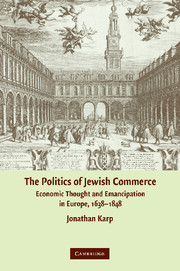Book contents
- Frontmatter
- Contents
- Acknowledgments
- Introduction
- 1 This Newfangled Age
- 2 From Ancient Constitution to Mosaic Republic
- 3 A New System of Civil and Commercial Government
- 4 The Natural Relation of Things
- 5 A State within a State
- 6 The Israelites and the Aristocracy
- 7 Jews, Commerce, and History
- 8 Capitalism and the Jews
- Afterword: Industrialization and Beyond
- Notes
- Bibliography
- Index
6 - The Israelites and the Aristocracy
Published online by Cambridge University Press: 18 July 2009
- Frontmatter
- Contents
- Acknowledgments
- Introduction
- 1 This Newfangled Age
- 2 From Ancient Constitution to Mosaic Republic
- 3 A New System of Civil and Commercial Government
- 4 The Natural Relation of Things
- 5 A State within a State
- 6 The Israelites and the Aristocracy
- 7 Jews, Commerce, and History
- 8 Capitalism and the Jews
- Afterword: Industrialization and Beyond
- Notes
- Bibliography
- Index
Summary
In 1799, as Fichte was composing his Closed Commercial State, the poet Novalis (Friedrich von Hardenberg) produced a classic German romantic depiction of feudalism and the Middle Ages. In language both vivid and analytic, Novalis's “Christianity or Europe” glorified the old corporate order of estates, guilds, and churches, while excoriating the Reformation and Enlightenment for fragmenting Europe and shattering its spiritual foundations. Approximately a decade later, as popular resistance the French Revolution climaxed, Adam Müller (1779–1829) inaugurated his project of extending Novalis's critique of Enlightenment to the field of political economy. In a sequence of works produced throughout the Napoleonic era, Müller drafted his own original historical model of Western and European socioeconomic development. As part of his effort to glorify the social relations of the Middle Ages, Müller identified the conceptual foundations of feudalism with the ancient Mosaic Constitution. He asserted that the Old Testament provides the original model of a true aristocratic polity. Its rejection of absolute private property and its conception of landownership as temporary usufruct; its restrictions against commerce and its outlawing of usury; its ideal of the nation as a spiritual entity and of society as a corporate family; its heroic and bellicose spirit exemplified by the people and its leaders – all amply demonstrate that the Mosaic constitution was the true originator of the medieval. At the same time the present degraded condition of both the Jews and the nobility reveals just how far both have fallen from their former state of grace.
- Type
- Chapter
- Information
- The Politics of Jewish CommerceEconomic Thought and Emancipation in Europe, 1638–1848, pp. 170 - 200Publisher: Cambridge University PressPrint publication year: 2008



